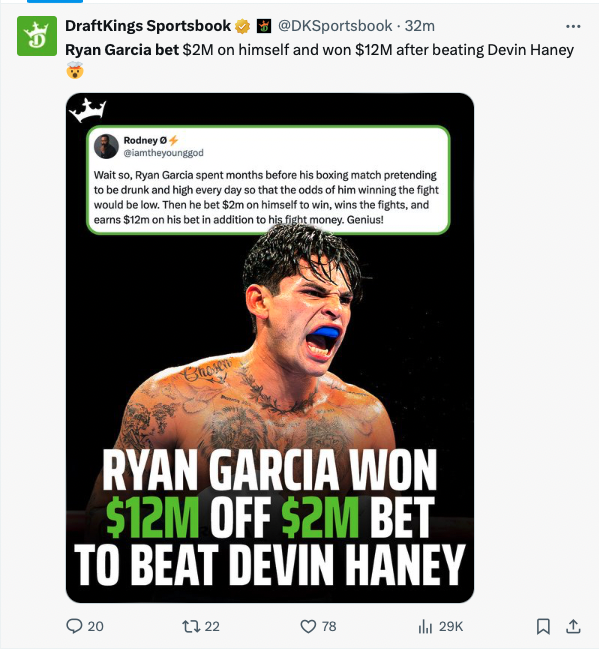Boxer Ryan Garcia Claims He Won $10M Betting On Himself, Opening Massive Can Of Worms If True
The drama continues after the Garcia-Haney fight, with a purported $2 million bet and a possible example of odds manipulation.
4 min

On Monday morning, boxer Ryan Garcia, fresh off an upset victory Saturday over Devin Haney atop a pay-per-view card from Barclays Center in Brooklyn, took to Instagram — where he has 11.2 million followers — to seemingly confirm a rumor.
Garcia shared a picture of himself in the ring post-fight with a screen capture of someone else’s social media post that read, “Ryan Garcia reportedly bet $2,000,000 on himself to defeat Devin Haney and was paid out $12,000,000,” accompanied by assorted emojis. Alongside the image, Garcia wrote: “If you bet, BET ON YOURSELF,” and went on to suggest he had indeed made major money wagering on himself to defeat Haney.
There has been no formal confirmation that such a bet was placed, but DraftKings Sportsbook’s social media account gave it some measure of temporary validity by sharing the information — in a since-deleted tweet (for the record, a DraftKings spokesperson told Casino Reports that Garcia did not place the bet at DraftKings Sportsbook):

If it’s true — a huge “if” at time of this writing — then the sports betting world has a messy situation on its hands, and the sport of boxing, which has no central organizing league and no rules prohibiting fighters wagering on themselves, an even messier one.
Following in Floyd’s footsteps
Before the fall of PASPA and the spread of regulated sports betting, when the only state in the U.S. where the activity was legal was Nevada, all-time great boxer Floyd Mayweather routinely brought the concept of fighters betting on themselves into the spotlight. Mayweather frequently put big money on himself to win at Las Vegas sportsbooks — a strategy that never failed, as he finished his career with a record of 50-0.
But for his final sanctioned fight, against Conor McGregor in 2017, as ESPN’s David Payne Purdum reported at the time, Mayweather went into a Vegas sportsbook and tried to bet $400,000 on the fight going under 9.5 rounds, was denied, and then tried to bet on himself by knockout and was also denied.
Such props were considered off limits, because Mayweather could, potentially or at least to some extent, manipulate the exact result of the fight (especially against an overmatched, novice opponent such as McGregor, an MMA superstar making his boxing debut). The message was that the only bet a boxer could place on his own fights was on himself to win, straight up.
That, of course, is still highly problematic. It’s the point made often about Pete Rose, who claimed he only bet on the Cincinnati Reds, never against them. Unless Rose bet on the Reds every single game, the exact same amount, he could theoretically be manipulating the situation, trying to lose games on which he didn’t bet to increase the odds for other games.
Mayweather never did lose a fight. But, just as an example, he could, in theory, have underperformed intentionally against Marcos Maidana in their first fight, a tougher win for Mayweather than most expected, juicing his odds to bet on himself to beat Maidana in their rematch.
Goosing the odds, intentionally or not
That brings us to Garcia, who is claiming he bet on himself as a +500 underdog — after a buildup to the Haney fight that saw him behaving extremely erratically.
Garcia took a 15-month hiatus from boxing to address mental health issues in 2021-22. From the press tour for the Haney bout right up through the fight, he often appeared unhinged, shared posts of himself drinking and smoking, failed to make the 140-pound weight limit (he weighed 143.2 and made no effort to shed the rest of the weight, instead paying a negotiated penalty fee), and generally presented himself as if he was compromised to some degree heading into the contest.
The 25-year-old boxer and those around him at times insisted everything was an act, designed to attract attention to the fight. It may have had the opposite effect, convincing fans not to tune in for a train wreck that increasingly seemed a mismatch in Haney’s favor.
But as it turned out, Garcia performed spectacularly in the second half of the fight (aided assuredly by not completing the effort to make weight) and it was a thrilling battle and not a mismatch at all.
And if he bet on himself — again, major “if” — after intentionally behaving in a way that made the odds against him slightly wider — another extreme “if,” as he seemed to most to be genuinely battling demons — then whoo boy, we have ourselves a boxing betting scandal.
Nobody but Garcia has confirmed the bet was placed. If it was placed, nobody knows yet if it was at a regulated U.S. sportsbook or done with an illegal bookie or an offshore operator. Given what we know about regulated U.S. books, getting down $2 million is no easy feat.
But social media was dripping Monday with people congratulating Garcia on his ingenious scheme. One X user called him “a true marketing genius.” Another called it “the biggest okie dokie in boxing history.”
What now?
Whether a bet was placed or not — and my strong suspicion is that it at least was not placed at any regulated U.S. sportsbook — it draws attention to the mess that is boxing allowing betting by athletes on their own events when most major sports have drawn a line on that.
The Association of Boxing Commissions — the closest thing the sport has in the U.S. to an oversight authority, in this case a group uniting the individual state athletic commissions — would be wise to state explicitly that the days of boxers, their family, or people in their training camps betting on their own fights are over. There has to be a rule against it and a penalty if you’re caught doing it.
Sports league officials talk all the time about how vital the “integrity” of their games is, and boxing is starting from a place where most sports fans question its integrity to begin with. This particular sport does not need to give the public added ammunition.
Imagine if Joel Embiid came out for Monday night’s 76ers playoff game against the Knicks bouncing around on two perfectly healthy-looking knees and ankles, suggesting he’d been faking his injury issues all season and especially in Game 1 two days prior, and the Sixers won as 6-point underdogs … and we found out later Embiid had bet millions of dollars on his team to win. Would we call that “genius”? Or would we call it the worst blow to the NBA’s integrity since Tim Donaghy?
Again, I don’t think Garcia was faking any of his issues. And I’m not convinced he actually bet on his fight.
But, just in case, the time is now to set clear rules that boxers can only bet on themselves the old-fashioned way: figuratively, not literally.






